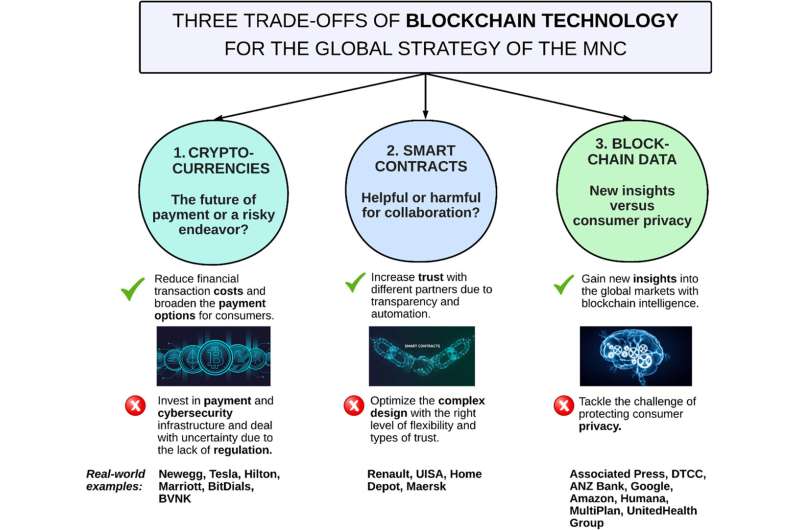This article has been reviewed according to Science X's editorial process and policies. Editors have highlighted the following attributes while ensuring the content's credibility:
fact-checked
proofread
New study helps global multinational corporations weigh pros and cons of implementing blockchain technology

Blockchain technology has become one of the most hyped advancements in recent years, but there hasn't been a clear understanding of the potential tradeoffs for its use by multinational corporations (MNCs). A new study published in the Global Strategy Journal provides a better understanding of blockchain merits and drawbacks by focusing on three particular applications of the technology in this sector: financial transactions, collaboration, and data analytics.
The study, "A perspective on three tradeoffs of blockchain technology for the global strategy of the MNC," was authored by Tuuli Hakkarainen of the University of Liverpool, Anatoli Colicev of the University of Liverpool, and Torben Pedersen of Copenhagen Business School. The researchers' interest in the topic came from their involvement with the MNC industry and government initiatives. The role of blockchain has been addressed by academic research in other fields, such as finance and operations management, but has gained much less attention in international business and strategy.
The team chose to focus on blockchain technology in terms of financial transactions, collaboration, and data analytics because they found these three areas to be the most promising, feasible, and less-researched aspects of the technology for MNCs. Within these three spaces, their research explored cryptocurrencies, smart contracts, and blockchain data.
"It was clear from the start that the role of cryptocurrencies as part of payment options and smart contracts to help collaborate with distant partners was central for firms doing business across borders," Hakkarainen says. "We also wanted to discuss blockchain data mainly for its untapped potential. For example, we believe that global firms are likely to be willing to invest in gaining real-time access to the different consumer tastes and behaviors across countries to have a competitive edge in those markets."
To build their understanding of the tradeoffs within these three applications of blockchain technology, the researchers conducted an in-depth investigation across countries and industries to determine whether cryptocurrencies, smart contracts, or data analytics were de facto implemented in the companies. They combined industry and company reports, third-party materials, case studies, news outlets, and social media discussions in addition to other publicly available sources.
The results are a more thorough understanding of the tradeoffs associated with the technology to help companies weigh their potential use. The team found that cryptocurrencies' merits include lower transaction fees, better security, and higher speed, but they necessitate expensive infrastructure and carry a stigma because of negative headlines. Smart contracts can streamline agreements between parties, yet they lack the flexibility that global firms need when interacting with suppliers and partners. Novel blockchain data can be plugged into marketing dashboards, but this can also threaten consumer privacy.
"We believe blockchain is here to stay and potentially revolutionize multiple aspects for firms and their consumers," Colicev says. "There are a lot of examples where we can see concrete evidence of how blockchain is already helping firms, not to mention the huge potential to help manage different hassles when operating abroad."
The authors caution that as with any new technology, firms would do well to limit the potential risks by piloting the use of blockchain in some parts of the operation in one country or trying smart contracts with specific partners. Because the jury is still out on its overall role in global MNCs, there's no need to "revolutionize" the whole business model at once.
More information: Tuuli Hakkarainen et al, A perspective on three trade‐offs of blockchain technology for the global strategy of the MNC, Global Strategy Journal (2024). DOI: 10.1002/gsj.1509
Provided by Strategic Management Society





















